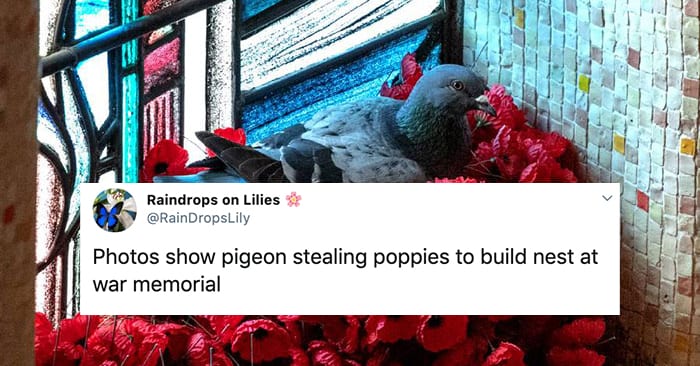For over a month, the staff at the Australian War Memorial in Canberra noticed that poppies laid on the Tomb of the Unknown Soldier were disappearing, one at a time. They were bothered at first because that is desecration, but after a while they spotted the culprit – a pigeon who was filching the flowers and using them to build a stunning nest near a stained glass window.
The window commemorates the wounded soldier and honors the quality of endurance.
https://www.instagram.com/p/Bh-Lcd-HA28/
Instead of being irritated at a bird for causing trouble, the staff there chose to see it the colorful nest as “a reminder of the powerful bond between man and beast on the battlefield.”
Even though most people today see pigeons as little better than rats with wings, during many of the world’s wars, they were considered powerful allies and communication tools.
Historian Dr. Meleah Hampton reminds us why:
“Particularly in the early wars, communication is really difficult. Wireless is in its absolute infancy in the First World War and telephone wires get broken apart in the shellfire on the Western Front. So pigeons are particularly of use in warfare when you’ve got a couple of men trying to get a message from where they are back to the backline: a pigeon can get that through sometimes when nothing else can.”
During WWII, 32 pigeons were recognized with the PDSA Dickin Medal, an award given to any animal that displays conspicuous gallantry and devotion to duty.
One pigeon, called White Vision, received his (or her) medal for “delivering a message under exceptionally difficult conditions and so contributing to the rescue of an aircrew while serving with the RAF in October, 1943.”
https://www.instagram.com/p/BjTJ9GOhY5h/
Just something to remember the next time you’re shooing them away at the park, or grumbling about the mess they’ve made of your car.
They might not be technical veterans, but on a day when we remember those who have spent part of their life in service to country, it seems fitting to remember that not everyone who sacrificed was human.






